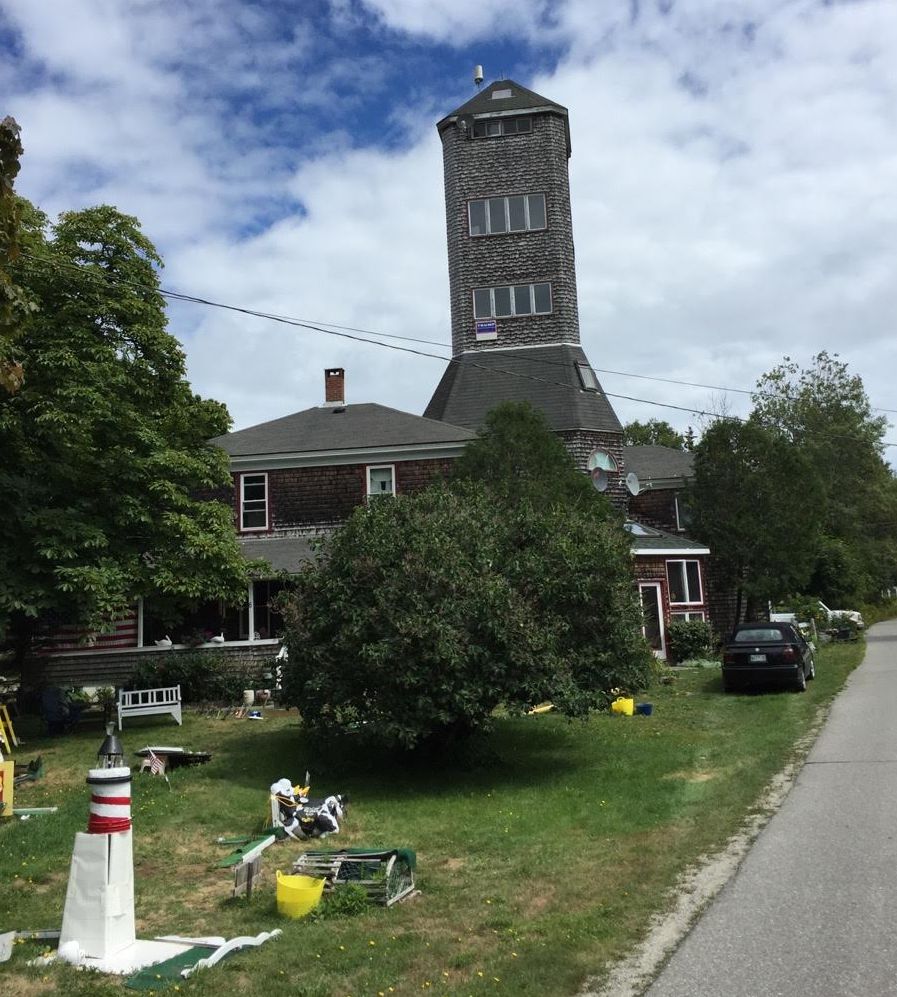Connecting state and local government leaders
Our editor-at-large documents how some small coastal communities are fighting for better telephone and internet services, but are advancing at a crawl.
MOUNT DESERT ISLAND, Maine — The month of October brought not only the glories of fall foliage to this neck of the woods but also a piece of exciting news: residents of Islesford on nearby Little Cranberry Island, would not suffer a threatened termination of the jury-rigged internet service they have been receiving.
It was a small victory in ongoing battles of the rural communities along coastal Maine to maintain basic telecommunications services—and to bring them up to 21st century standards. Not only internet but also telephone services are far from up to date.
As a resident of Northeast Harbor here on the island, I have experienced the frustrations of spotty service, and spent countless hours trying to fix and upgrade systems I need to work and stay in touch with the rest of the world.
Townships here are similarly frustrated with service. But on a national level, leaders from all levels of government seem cautiously optimistic about closing the digital divide between rural and urban areas during Donald Trump’s term as president, Route Fifty reported late last year.
Broadband Woes
But back to my story about Islesford.
It’s a small place, whose winter population numbers only about 70 souls. Summer residents swell the count to 300 during the season. And many people take the postal service boat, seasonal ferries or private boats to visit the long pier, home to half a dozen businesses and the nearby Islesford Historical Museum.
The Islesford Dock Restaurant has been a principal attraction, a destination for off-island visitors who have enjoyed lobster rolls, Bar Harbor blueberry ale, and a lovely view back toward the mountains of Acadia National Park.
With such a small population, there’s no incentive for a private telecom company to run an underwater cable to provide internet services. So, in a classic case of Maine ingenuity, a private homeowner offered to place a receiver on the top of a quirky, six-story tower attached to his home—the highest place on the island. It receives signals from Southwest Harbor, perhaps three miles across open ocean, which are then distributed to other residents of the town.

Last year, the owners of the tower, Jim and Sallye Parrish, decided they no longer wanted the Redzone Wireless service from Southwest Harbor, opting instead for a satellite-based provider. And they demanded that residents and Redzone pay them for keeping the Redzone equipment on their tower. That led to a frantic passing of the hat among island citizens, raising about $1,000. But eventually the Parrishes declined to take the money and declared that they’d keep the equipment up until another solution is found.
Redzone President Jim McKenna, in an e-mail to town officials last summer, said: “To my knowledge, Jim Parrish’s home is the only structure on Islesford that can reliably reach the mainland. That’s why I’ve advised the town to put up a tower for the last seven years.”
Towers and Telephones
A tower in Islesford would doubtless improve cell phone coverage, while also receiving the Redzone internet signal.
Indeed, telephone service is also a big issue on Mount Desert and other Maine islands and elsewhere in rural areas of the state. There simply isn’t enough coverage, and often towers are highly controversial.
On Mount Desert Island, managers of Acadia National Park and homeowners too object to any tower that might spoil their views. It took five years, for example, to approve and build an AT&T-sponsored tower in Otter Creek, on the edge of the park. Officials concerned that the tower would spoil the view from higher elevations in the park insisted that it be disguised as a pine tree. Finally activated in late August, the structure will provide much-needed service from AT&T and other providers in the remote town and nearby park land.

In Northeast Harbor, another undisguised cell tower has arisen adjacent to the ancient but still popular Forest Hill Cemetery. Controversy and delays dogged this project too. The dead may not themselves have objected from underground. But their descendants, opposed to having a modern excrescence in view of many grave sites, have represented their interests.
Some say cellphone service is essential to the health and safety of those using the national park—and the issue gained urgency this summer, when 39-year old Nathan Savage suffered a heart attack while swimming in Echo Lake.
No cell service was available there, and so ambulance response was delayed. The situation was described in a letter to the Mount Desert Islander by Robin Reath Graves, the deceased’s mother-in-law: “And so, as my daugher was performing CPR on her husband, she was trying to get through on her cellphone. Not being able to summon help caused way more anguish than ever should be necessary.”
Graves continued: “In this day and age, cell phones are no longer a luxury. We depend on them like our right arm. I find it reprehensible that this island, with so many visitors from around the world, home to one of the most spectacular and popular national parks, still has dead spots with no cell service.”
Broadband Battles
Spotty cellphone service is probably not as frustrating to residents here as is inadequate availability, speed and reliability of internet service. This is a problem that affects people’s ability to work, to communicate and to access entertainment only available through modern broadband services.
The only provider of fiber-to-the-premise internet service in much of Maine is Time-Warner Cable, recently merged with Charter Communications. But it serves only a minority of households and businesses on Mount Desert Island and in other stretches of rural Maine.
In 2015, the town of Mount Desert, one of five on the island, commissioned a study of the broadband challenge. The town encompasses the villages of Otter Creek, Seal Harbor, Northeast Harbor, Somesville, Hall Quarry and Pretty Marsh, and the 2010 census put its year-round population at 2,053. The population swells in summer and fall, when summer residents come to occupy seasonal residences and close to three million tourists visit Acadia National Park.
I had a lot of first-hand experience with the frustrations of pursuing good internet service. I and many others on the island are served by the local telephone company, FairPoint Communications, Inc., which is headquartered in Charlotte, N.C., and serviced by networks of help-desk and technical support people in countries as far-flung as Indonesia and Guatemala.
FairPoint provides DSL service that’s slow and unreliable. It’s too slow, for example, to stream videos, and people report difficulties with sending large files by e-mail. So the holy grail for many is to find a way to persuade Charter Communications to hook us up.
My own odyssey this summer began when I learned that both adjacent premises—the golf clubhouse to the east of my lot, and my neighbor’s house to the west—had managed to secure Charter broadband. Why not me?
It turned out that each agreed to “business” rates for their service, year-round monthly fees of about $200. That seemed too expensive for my seasonal use. Still, right on my telephone pole, the TW cable hovered tantalizingly close to my house.
After quite a few calls, Time-Warner agreed that I might qualify for service and said they’d send a contractor out who would install it if all went well. To get a relatively inexpensive, and seasonal, “triple-play” package, I would have to change my phone number, technicians said. That would be a big deal in this corner of rural Maine., where you don’t have to punch 10 digits, only 7, to make a local call. Everyone has a 276 exchange, followed by four digits easily memorized to dial one’s friends.
To cut a very long story short, it took calls to and from the Federal Communications Commission, the Maine Public Utilities Commission and the office of the president of Time-Warner to establish that the technicians were wrong and that I could in fact “port’ my number from Fairpoint to the TW triple-play.
I was excited when an installation crew under contract to TW arrived to fire up my service. But then they informed me that because there was no “drop” on my telephone pole, they could not do their job until a “construction” crew came out to create the drop. Whether the “construction” crew could ever be reached, or would wish to spend its valuable time for my single account, were unknown unknowns, as former Defense Secretary Donald Rumsfeld might say.
This story may yet have a happy ending. It turned out that the construction crew was a guy in town who’s a friend of a longtime friend. Just as we were leaving to drive home to Maryland, the crew and his truck came out and installed the drop. Next summer, who knows, I may get the Charter Communications contractors to install the service.
Studies, Slow Progress
As a summer resident, I am not on the top of anyone’s priority list when it comes to broadening access and improving the quality of broadband service on the island. Many people do without, of suffer even weaker Fairpoint signals than those I receive. So there’s been a long-running effort to see how the situation can be improved.
The Town of Mount Desert about two years ago commissioned Tilson, a technology consulting and management firm headquartered in Portland, to study options for expanding broadband access in the isolated villages and rural areas it encompasses. Tilson’s exhaustive report on options for improving service was delivered on Sept. 25, 2015. (A similar, but nationwide study of what local governments can do to spread broadband service was issued in November by the National Resource Network. It is titled “Access and Inclusion in the Digital Age: A Resource Guide for Local Governments.”)
Tilson’s assessment of needs spoke tersely but compellingly of the reasons why the community so badly wants better. Good service would help small businesses, and encourage more year-round residence, it said. It would aid in retention of high school and college students (at the College of the Atlantic) through better internet access. It would enable “students of all ages to complete digital and streaming assignments from home as efficiently as when in school,” a vital need in today’s technology-centric education. Community goals also included providing WiFi as an amenity in highly trafficked areas such as village centers and harbor marinas.
The most robust solution is also the most expensive: running fiber to each home and business—“an investment in the future of the town’s economic well-being,” as the report put it. Tilson estimated the costs at $7.1 million to $13.3 million, but projected 10-year productivity gains worth between $7 million and $29 million, as well as direct income gains between $4 million and $16 million in new wages.
Adding nodes for DSL distribution was another suggested solution. “The speed experienced by the end DSL user depends entirely upon the distance between their premise and the node where the signal originates,” the report said. Adding two nodes would cost $60,000. Speeds would be much slower than under the first solution.
Another idea the report advanced was provide Wifi coverage to harbors and village downtown areas. It’s an inexpensive solution—$6,000 to $10,000 per area served—but one that does not meet residential or business needs.
Wendell Oppewall, a member of the Town of Mount Desert’s broadband committee, told me last summer that the fiber-to-the-house solution was deemed too expensive, and that the town was opting to pursue a partnership with Charter Communications to provide service to those most in need of it. He recalled that in June, voters in nearby Bar Harbor, the largest town on the island, rejected funding for an engineering study for a expensive town-owned fiber-optic network. The 47-57 vote came during a town meeting and reflected, Oppewall said, the majority’s view that many would be taxed to benefit relatively few businesses downtown. But the issue may well be revisited this year, as townspeople chafe under fees Charter is charging for existing fiber connections. If Bar Harbor does build its own network, it would follow the lead of such other communities as Martin County, Florida, which is now spending a lot less than it did when it was still being served by Time-Warner Cable, though its network serves public institutions, not businesses and individuals.
Mount Desert Island Town Manager Durlin E. Lunt said in a recent interview that the local government is now attempting to pursue an incremental approach to expanding internet service, focusing first on the remote and sparsely populated village of Pretty Marsh, where service is poor to nonexistent. The town has contracted with a local engineering firm, James W. Sewall Co., to negotiate with Charter Communications on the project. Sewall’s efforts are led by Michael Edgecomb, who knows the business well, having worked for Time-Warner Cable for many years before joining the engineering firm.
Lunt said it has not been easy to get Charter to offer a bid for service along these back-country roads. The cable company usually won’t make the capital investment unless it can reach 20 houses per mile—and in Pretty Marsh, the average is only about half that. Federal and state funds funneled through Maine’s ConnectMe program likely would cover some of the excess costs, and the town might well also contribute, Lunt said. He expressed concern that Charter’s seeming lack of interest in providing a timely proposal might cause him to miss an upcoming deadline for filing a warrant for the town’s share that could be debated at the annual town meeting in early May.
And so it is that modern telecommunications systems advance at a crawl in rural areas of Maine and other states around the nation.
Timothy B. Clark is Editor-at-Large at Government Executive’s Route Fifty.

NEXT STORY: NASA preps for space-based laser communications




